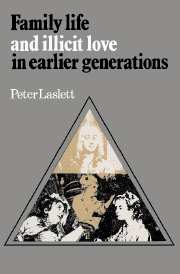Book contents
- Frontmatter
- Contents
- Introduction: the necessity of a historical sociology
- 1 Characteristics of the Western family considered over time
- 2 Clayworth and Cogenhoe
- 3 Long-term trends in bastardy in England
- 4 Parental deprivation in the past: a note on orphans and stepparenthood in English history
- 5 The history of aging and the aged
- 6 Age at sexual maturity in Europe since the Middle Ages
- 7 Household and family on the slave plantations of the U.S.A.
- Bibliography
- Index
4 - Parental deprivation in the past: a note on orphans and stepparenthood in English history
Published online by Cambridge University Press: 12 September 2009
- Frontmatter
- Contents
- Introduction: the necessity of a historical sociology
- 1 Characteristics of the Western family considered over time
- 2 Clayworth and Cogenhoe
- 3 Long-term trends in bastardy in England
- 4 Parental deprivation in the past: a note on orphans and stepparenthood in English history
- 5 The history of aging and the aged
- 6 Age at sexual maturity in Europe since the Middle Ages
- 7 Household and family on the slave plantations of the U.S.A.
- Bibliography
- Index
Summary
Parental deprivation is a term typical of the social observation which goes forward in our day, perception of a body of facts diffused through a strong sympathy for the position of those to whom the facts relate. Illegitimate children are likely to be parentally deprived, because they are brought into the world without proper fathers: they arouse our interest because of that circumstance, for they appear as the helpless victims of a powerful social and familial convention. We have seen that the numbers of children born outside wedlock were sometimes quite large in the past, and the numbers so conceived considerably larger. In our day the proportion of children alive who were registered as illegitimate at birth must be substantial. But bastard children cannot be anything like a majority of the parentally deprived, now or at any time in history. Those who suffer the actual loss of the father – or of either parent – have always far outnumbered those who never had recognized fathers at all.
In spite of the fact that so many conceptions and births took place outside marriage in the past, few, or very few, of the children alive at any time were illegitimate. This is because bastards died so quickly and because some of them ceased effectively to be bastards by the marriage of their mothers, sometimes, though not always, to the men who had procreated the children in question.
- Type
- Chapter
- Information
- Family Life and Illicit Love in Earlier GenerationsEssays in Historical Sociology, pp. 160 - 173Publisher: Cambridge University PressPrint publication year: 1977
- 7
- Cited by



